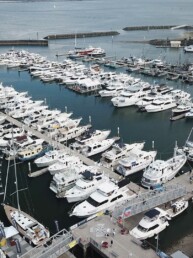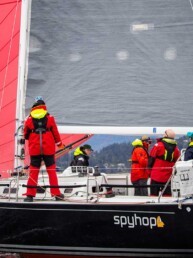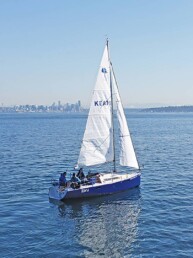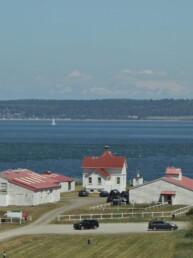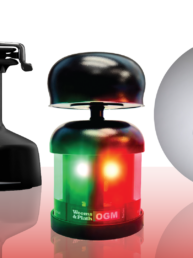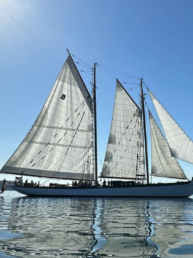When switching marinas is more sentimental than anticipated
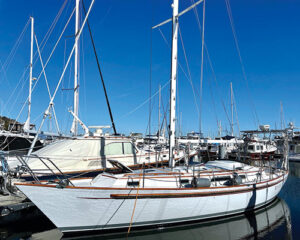
For nearly 20 years, we kept a series of boats at our homeport, Elliott Bay Marina; the latest being our 1984 Passport 40 Rounder. A few weeks ago, I backed out of our slip on J Dock, pointed the bow down the fairway toward the massive breakwater that has held dozens of storms at bay, and began slowly passing familiar sterns with their familiar names.
How many times have I traveled this same path to sailing adventures near and far? How many evenings have we sat in the cockpit watching the lingering sunsets over the Olympic Mountains? How many times did I fall into conversations with perfect strangers about the weather, cruising plans, or the latest improvement project? How many harbor seals have popped their heads up to say hello? How many times have I paused under the little gatehouse roof at the top of our dock to enjoy the hanging flower baskets in summer, or for temporary relief from the wind and rain in winter?
There was no fanfare, no music, no goodbyes from neighbors or staff. I just quietly left our homeport, for good this time.
There are an endless number of topics we discuss and obsess about as boaters, from destinations and weather to motors, batteries, and the latest must-have technology. But the one topic that I haven’t given a lot of thought to is the marina where many of those topics have been discussed.
After all, for those who keep their boats in the water throughout the year, a homeport is the place where your boat likely spends most of its time — and for us, who have lived aboard for months at a stretch in the past, where we did as well.
Perhaps those of us who cruise a lot are conditioned to view marinas as transactional places. You pay someone to let you tie your boat up for a night or two while you run errands, fill the water tanks, and top up the battery bank.
But when you love the marina where you keep your boat, it becomes a far more meaningful place.
This idea dawned on me recently when, after decades of living in Seattle, we sold our townhouse and moved to a new house on Bainbridge Island. At first, we decided to keep the boat moored at Elliott Bay Marina with the assumption that we would use it as a little home away from home after a night out in the city or a visit with my mom just up the road in Ballard. My wife, Deborah, dubbed it our “pied-á-mer.”
But we found we used it as such far less than we thought we would. And we learned the hard way just how messed up the ferry service between Seattle and Bainbridge can be on weekends, when we typically wanted to visit the boat either to use it, enjoy it, or work on it.
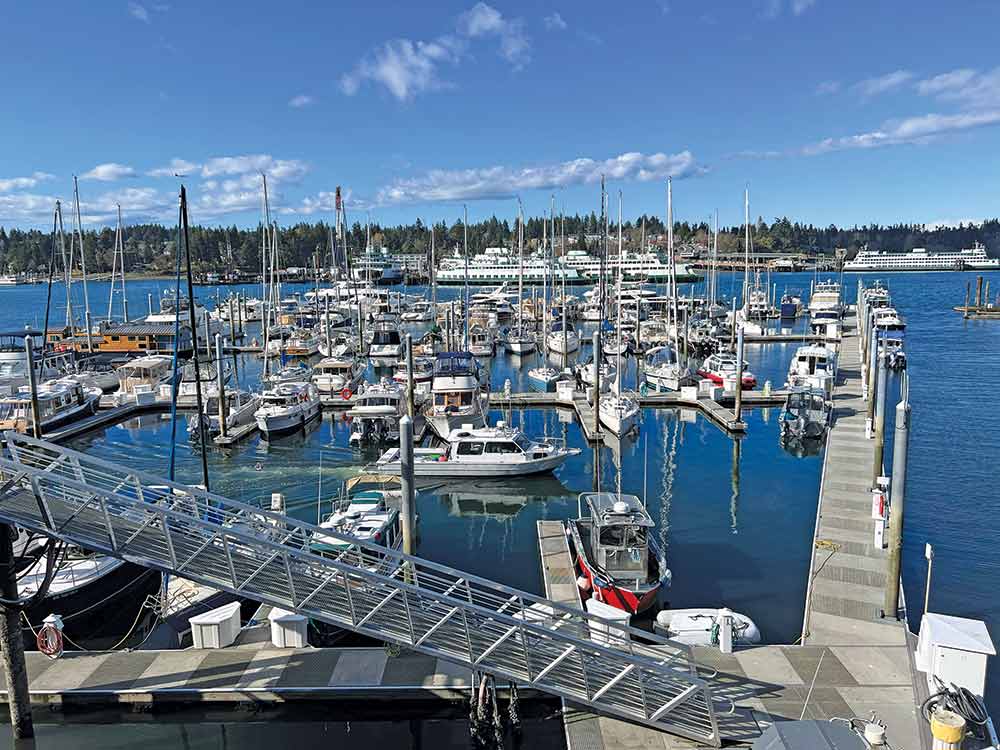
When my mom passed away late last year, I just couldn’t see a good reason to keep the boat there any longer. I mentioned to Deborah that we could start looking for a marina on the west side of Puget Sound, closer to our home.
She wasn’t enthusiastic about the idea.
Our dating relationship had just become a serious relationship back in 2004 when we last switched marinas. I had lived aboard for years at Lee’s Landing, a charming, family-owned marina under the Aurora Bridge on Lake Union.
That marina was where I started learning how to own and skipper a sailboat. Getting into the slip wasn’t exactly easy, requiring a tight turn that brought the stern within kissing distance of the floating home across the fairway from me. I’d wave at my neighbor, who probably never stopped worrying that I would shatter the kitchen window with my dinghy davits.
I loved looking at the cathedral-like arches of the Aurora Bridge soaring above me almost as much as I enjoyed the call-and-response horns from boats transiting the nearby Fremont Bridge.
But that bridge and the Ballard locks seemed to lose their charms when they became obstacles to getting out on the wider waters of Puget Sound on weekends and vacations. So we decided to relocate our homeport to salt water.
I remember being gobsmacked by the splendor of Elliott Bay Marina when we first arrived. It was more like a nicely designed park than a marina. The grounds were immaculate, the parking was plentiful, and the views of the Space Needle and downtown Seattle were incredible.
We loved the low-key Thursday night sailboat races and the outdoor party that followed. We enjoyed getting to know the group of boaters who happened to moor near us on J Dock. Over many years, we met their families, watched their kids grow up, made lifelong friendships, celebrated holidays, traded sea stories, and shared tips on our favorite anchorages. We commiserated when the repair guy pronounced their engine beyond saving and celebrated when they hoisted those new sails for the first time.
People and boats came and went, but that sense of community in our little corner of the marina never changed.
I understood Deborah’s reluctance to say goodbye to the marina. Despite that, we decided we should at least explore options close to home.
And so on a Monday morning in January, I pulled together a list of marinas and started making calls, fully aware that most of them would not respond, or if they did, likely offer me condolences and a spot on the waiting list.
But then Eagle Harbor Marina called back. They had a slip available and asked if I’d like to come take a look. I jumped in the car minutes later.
I knew from my research that Eagle Harbor is one of four well-regarded marinas operated locally by the Marsh Andersen Company.
The drive from our house to the marina took exactly eight minutes. I turned down the narrow residential street leading to the marina, then into the ample parking lot. Across the bay, I could see the ferry dock and the old Elwha tied up nearby. Winter rowers were leaning into their synchronized strokes as the chase boat followed close behind. A series of dock carts were tipped up at attention by the gatehouse.
I walked down the ramp to the sturdy, recently built docks alternating between squares of concrete and salmon-friendly grates. As I made my way to the slip, I noticed that the electrical pedestals and the water standpipes were all in excellent condition. And in a sign of the commitment to clean water, each slip had access to a quick and convenient dockside pump-out.
There was no breakwater, but the high hills that rose above the marina to the south would be more than enough to handle any winter storm in the Pacific Northwest. I soon got talking with several resident boat owners, whose only complaint was that the huge dockside flower baskets in summer sometimes left petals on the deck of downwind boats.
I called Deborah and convinced her to come down to have a look as well. And within a few minutes, we decided to take the slip. It happened so fast that at first the magnitude of the decision hardly registered.
Were we really ready to leave behind a place that meant so much to us for so long?
A few days later, we cleared the breakwater at Elliott Bay Marina for the last time, made the 4-mile crossing of Puget Sound, and nudged Rounder safely into her new slip at Eagle Harbor Marina.
I began to wonder, how many times would we leave this new slip for sailing adventures near and far? How many evenings would we sit in the cockpit watching the ferries come and go? How many times would we fall into conversations with our boat neighbors about the weather, cruising plans, or the latest improvement project?
There was no one to greet us that day. No band played. It felt a little strange tying up to the dock, looking around at the sterns of unfamiliar boats with unfamiliar names.
But it also felt right. It was time for a change. We had a slew of new memories to make. And with time, this marina, too, would transform into a homeport for the boat and for us.
Marty McOmber is a Pacific Northwest sailor, writer, and strategic communications professional. He is currently working on refitting and improving his 1984 Passport 40, Rounder, for continued cruising adventures near and far.
